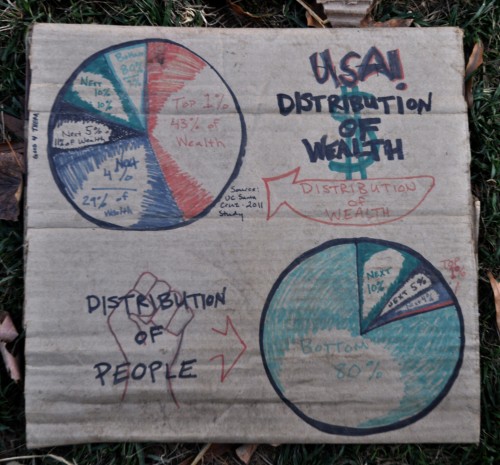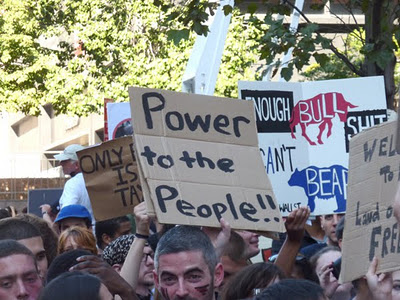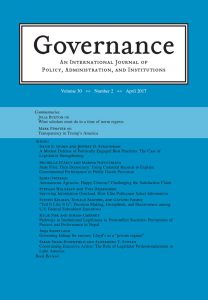Occupy’s Mic Check: A Tactic to Disrupt Power, Not Free Speech
Author’s Note: This piece was originally posted to Sociology Lens on December 10th. On December 13th, the piece was temporarily removed and I was asked to make revisions to make more explicit the conventional sociological themes in this piece. This request was made as the result of pressure from a senior professor who deemed this piece too “polemical” and not “sociological.” While I and many others in the discipline have epistemological objections to very concept of value-free social science, and thus view with suspicion any implication that sociology can be separated from politics, I agreed to make revisions, because I think that argument in this piece important and can only be strengthened by further reference to the social theory canon. The downside is that the post is now less accessible to a popular audience than it was originally intended to be, so I have archived a copy of the original here. Finally, I must note that, while examining power is, perhaps, the oldest and most important task of sociology, it is (and has always been) political by nature.
A recent news piece for Inside Higher Ed reports on several instances where students have disrupted public presentations by conservative academics, activists, or politicians. The students used “the human microphone”—i.e., a practice of amplifying a speaker’s voice by having many people repeat the speaker’s words in unison—to offer counterpoints to the arguments being made by the presenter. The article’s author, Allie Grasgreen, asserts that the mic checking the conservative presenters is tantamount to “censorship.” This assertion shares the logic of what Karl Rove demanded when he was mic checked at John Hopkins:
If you believe in free speech and you have a chance to show it… if you believe in the right of the First Amendment to free speech… then you demonstrate it by shutting up and waiting until the Q&A session… line up behind the mic…
[youtube]http://www.youtube.com/watch?v=nlko7nweb4k[/youtube]
But Grasgreen and Rove both miss the point. Occupiers are trying to demonstrate—through the very performance of this act—that “free speech” is not evenly distributed. The point is that only the 1% ever find themselves at the podium. The 99% are left to fill the seats in the audience, and, if they are lucky, they may have the chance to do as Rove commands and line up behind the mic for a few brief seconds in the spotlight. This is, of course, because the opportunity to speak and to be heard is inextricable from issues of wealth and power. The few who hold these assets in abundance have more purchasing power in the attention economy. K Street is nothing if not an industrialized machine for converting money and power into speech that will be heard. Sure, we all may have “free speech,” but as George Orwell quipped in Animal Farm “some animals are more equal than others.”
The problem with the current discourse surrounding “free speech,” as it pertains to the Occupy movement, is that it has been cast in a radically conservative tone—it is backward looking, towards the white, male, and aristocratic thinkers of the Enlightenment who did not have to worry about power because they already had it. The tendency is to assume that, despite all the evidence to the contrary, we all somehow have equal access to the public sphere. Sociology has long been antagonistic to this concept of free speech, instead, viewing speech (an the knowledge embedded within it) as intimately tied to power. As C.W. Mills famously noted in his (1956) The Power Elite:
American men of power tend, by convention, to deny that they are powerful […] So firm a part of the style of power-wielding have they become that conservative writers readily misinterpret them as indicating a trend toward an ‘amorphous power situation.” […] But the “power situation” of America to is less amorphous than is the perspective of those who see it as a romantic confusion. It is less a flat, momentary ‘situation’ than a graded, durable structure. […] It is the form and the height of the gradation of power that we must examine if we would understand the degree of power held and exercised by the elites.
In short, Mills is saying we are a society comprised of institutions (most importantly, military, political, and financial institutions) and our positions within these institutions determine the levels of power and influence we have. These institutions perpetuate historical inequalities, transmitting unequal power relations across generations. Mills goes on to connect link power and freedom, saying, “[m]oney provides power and power provides freedom.” Mills highlights the mistake of talking about freedom in binary “free or unfree” terms. Freedom of speech, like all freedom, has many dimensions and gradations. When we say “free speech” we really mean “free political speech.” For political speech to be meaningful, it requires attention, which is a finite resource—and, a resource that has been marketized. Attention goes to the highest bidder—the person with most economic, social, cultural, or symbolic capital to trade (as Pierre Boudieu would say). More recent theorists have termed these conditions “the attention economy.” This economy is an ever-shifting field where those already in power seek to consolidate their position by establishing exclusionary practices (i.e., a habitus) that distinguish them from others and continue to draw attention their way. Those who control institutions get to write the rules and the rules will always ensure that they are heard at the expense of others.
 Michel Foucault made a similar argument from a historical perspective. In his (post-)structuralist interpretation of history, various chronological epochs—discursive regimes as he sometimes called them—are define by the relationship between power and the articulation of certain situated knowledges. Foucault obseved that certain ideas, speakers, and media had more traction than others at any given point in history. For example, the pronouncement of the priest may hold sway in one era, but be almost insignificant compared to the written records of the clinic in another era. When we speak, we are always implicitly invoking our institutional position. As I write this piece, I am ever-conscious of the fact professors will read it as the work of a grad student. In some countries, it is even customary to ask the age of a speaker before listening to his/her argument. We might also consider observations in intersectional works like Black Feminist Thought, where Patricia Hill Collins demonstrates that being black and being women makes one’s voice less likely be heard, regardless of content. Only those at the very top have the luxury of (naïvely) assuming their speech is interpreted on its own intrinsic merits. The world is not flat (Thomas Friedman not withstanding); those at the top of the hill have an easier time projecting their voices.
Michel Foucault made a similar argument from a historical perspective. In his (post-)structuralist interpretation of history, various chronological epochs—discursive regimes as he sometimes called them—are define by the relationship between power and the articulation of certain situated knowledges. Foucault obseved that certain ideas, speakers, and media had more traction than others at any given point in history. For example, the pronouncement of the priest may hold sway in one era, but be almost insignificant compared to the written records of the clinic in another era. When we speak, we are always implicitly invoking our institutional position. As I write this piece, I am ever-conscious of the fact professors will read it as the work of a grad student. In some countries, it is even customary to ask the age of a speaker before listening to his/her argument. We might also consider observations in intersectional works like Black Feminist Thought, where Patricia Hill Collins demonstrates that being black and being women makes one’s voice less likely be heard, regardless of content. Only those at the very top have the luxury of (naïvely) assuming their speech is interpreted on its own intrinsic merits. The world is not flat (Thomas Friedman not withstanding); those at the top of the hill have an easier time projecting their voices.
We must ask ourselves: Who benefits from the belief that we have equal access to political speech? The obvious answer: Those who already control it. Marx recognized long ago that those in power benefit when they can convince others to adopt an ideology that reinforces their own position. When it comes to free speech, America appears to have fallen into a state of “false consciousness,” where we blissfully deny that the obvious lack of representation that most of us experience. How can we, in good faith, claim equal access to political speech in light of the Supreme Court’s recent Citizens United decision, which makes the linkage between access to money and access to speech de jure and not merely de facto? American politics is explicitly and affirmatively runs on a pay to play model. Were this not true, the lack of competitive elections and the sham that is modern broadcast media would render most political speech irrelevant anyway. Occupy’s mic check tactic is controversial because it challenges the prevailing ideology that political speech is uniformly accessible. It is performative critique: The voiceless demand a voice and are immediate silenced via institution mechanisms of force and coercion. It is for us academics to articulate the argument, the Occupiers have done their part in demonstrating it.
Importantly, this criticism of contemporary discourse surrounding free speech is not new. There are many detractors to those who believe that the de jure existence of the First Amendment (or its analogs in other countries) as well as some basic democratic institutions somehow guarantee de facto equal representation in public discourse. Thinkers such as Jürgen Habermas who cling to idealistic Enlightenment conceptions of radically free, rational, and (as Charles Taylor describes) “atomistic” individuals have been criticized by commentators with communitarian, neo-Marxist, feminist, post-Modern, and many other backgrounds. Many of these critics have argued that the only way to challenge system characterized by systematic exclusion is from without. Habermas’s mentor, Herbert Marcuse, for example, called for a “Great Refusal” by those on the margins. Similarly, Audre Lourde argued that “[t]he master’s tools will never dismantle the master’s house.” Occupy’s mic check strategy embodies this sort of theoretical perspective, seeking to rupture the norms of public discourse to which they have been systematically denied inclusion.
What we need is an updated notion of free speech that accounts not only for negative freedom (i.e., freedom from constraints) but also for positive freedom (i.e., freedom to be recognized) as well. That is to say, for the right to free (political) speech to have a practical significance, it must also imply a right of equal access to the public sphere. Of course, there are practical limits to equal access. Attention given to one individual or group comes at the expense of attention to others. But what the Occupy movement seems to be rejecting is the current (arguably anti-democratic) reality where distribution of access is left to be determined by market forces. Occupiers are struggling for the democratization of political speech. The primary purpose of Occupy’s use of the human microphone at public speaking events is not to disrupt, but to be heard. It is not an assault on free speech but a tactic for obtaining it.
 To fully understand extent of and limits to free speech, we must also examine the justifications used when suppressing the activists’ attempts at having their voices heard. The police who interrupt these mic checks are often publicly valorized as protecting free speech. Such claims are naïve, if not outright deceptive. The real reason why universities break up these actions is because they want to preserve and protect the routine operation of the bureaucracy; it has little to do with freedom and is, instead, about rationalization (what sociologist Max Weber described as the tendency of Modern bureaucratic institutions to value efficiency, calculability, predictability, and control above all else). We should not conflate the maintenance of order and the protection of institutional reputation (zwecktrational action) with struggles motivated by the pursuit of an abstract ideal of freedom (wertrational action).
To fully understand extent of and limits to free speech, we must also examine the justifications used when suppressing the activists’ attempts at having their voices heard. The police who interrupt these mic checks are often publicly valorized as protecting free speech. Such claims are naïve, if not outright deceptive. The real reason why universities break up these actions is because they want to preserve and protect the routine operation of the bureaucracy; it has little to do with freedom and is, instead, about rationalization (what sociologist Max Weber described as the tendency of Modern bureaucratic institutions to value efficiency, calculability, predictability, and control above all else). We should not conflate the maintenance of order and the protection of institutional reputation (zwecktrational action) with struggles motivated by the pursuit of an abstract ideal of freedom (wertrational action).
It is also important to recognize that the logic of this debate over access and control extends beyond issues of free speech and the human microphone. Political opponents have made similar criticisms of the Occupy movement’s tactic of indefinite encampment on (often privately-owned) public spaces. These detractors have argued that by camping in a public space, Occupiers are, simultaneously, denying others the freedom to use that space. Again, this concept of freedom is blind to power. Like speech, space is not evenly distributed. If the mic check tactic aims at the democratization of speech, encampments aim at the democratization of space. Occupiers are protesting a society in which the town square has given way to the shopping mall. The encampments are, in part, a statement about the forfeiture of public space to the private sector—that is, out of the hands of the 99% and into the hands of the 1%. Absence of public space precludes public assembly. The thought of protests on Las Vegas’ sidewalk-less strips is difficult to entertain. Systematic denial of space is also systematic denial of speech. For this reason, claims that the encampments constitute a denial of their freedom to assemble (especially when articulated by those who already control the vast majority of the space) ring hollow.
Both critics and journalists will sound hopelessly out of touch so long as they continue to apply to Occupy the very concept of freedom that the movement is criticizing. Occupy affirms what Cicero observed long ago: “Freedom is participation in power.” While this aphorism may be a bit simplistic, it is certainly true that a concept of freedom that is blind to power merely serves to reinforce it.
Follow PJ on Twitter: @pjrey





1728-4457/asset/PopulationCouncilLogo.jpg?v=1&s=03074651676b98d6b9d0ef1234bd48fe7ff937c3)

Absolutely dead on PJ. I have thought this argument out before as well, but I’ve never been able to articulate it so well.
From a political science perspective, you might be interested in the work of author Marla Brettschneider. She brings together a lot of critiques against current democratic practice (particularly those rooted in Liberalism) and puts together the outlines of what she calls a Democratic Theory from the Margins (title of a book too!). I used it recently as a framework for analyzing the Occupy movement in a paper, and it has a lot to offer. I highly recommend it, it has a lot in common with the argument you make here.
I’m very glad you got this back online! I think it is a terrifically important point to be making.
So, in other words, the law shouldn’t apply to Occupy because its heart is pure and it’s on the right side, even when it prevents someone from speaking because it only interrupts people who are part of the one percent. This is not a new analysis of the law–it’s a childish and entitled case of special pleading.
That is complete misinterpretation of the point made in this piece–a straw man. Concepts of purity and truth have no place in this argument. The central premise is that freedom can only be understood in the context of power. I am claiming that it is disingenuous and, frankly, straight-up counter-intuitive to claim that Karl Rove and the mass of anonymous audience members have equally access to speech. Rove’s power afford him the ability to clear the stage and silence the room whenever he wishes. Due to a lack of power, the 99% must disrupt if they (we) wish to be heard. Were #occupy to have retreated from such strategies, the movement would never have influenced public discourse in the same way.
And who are the ones to decide which person deserves to be “mic checked”? Are they not some who gain social power within groups such as occupy?, some who through force of personality or through a legitimate or illegitimate authority become leaders or directors of action?
I’m interested to know how such decisions to disrupt were taken.